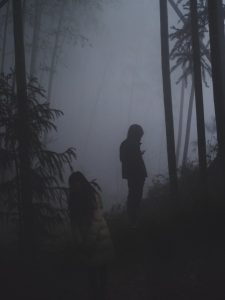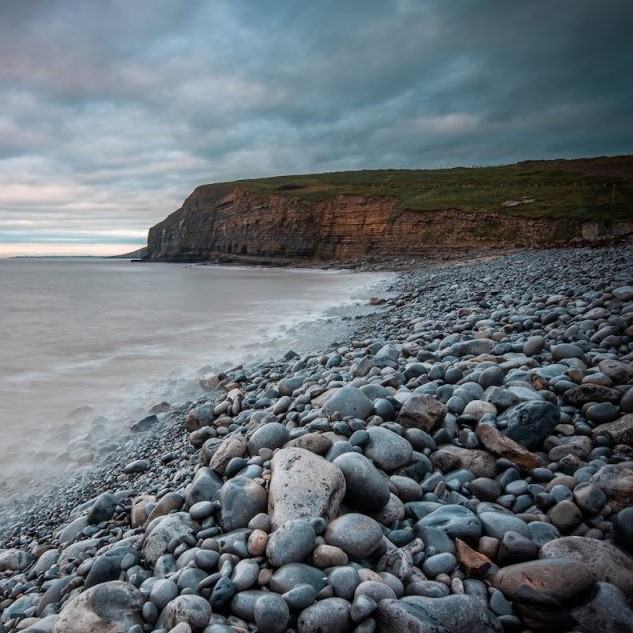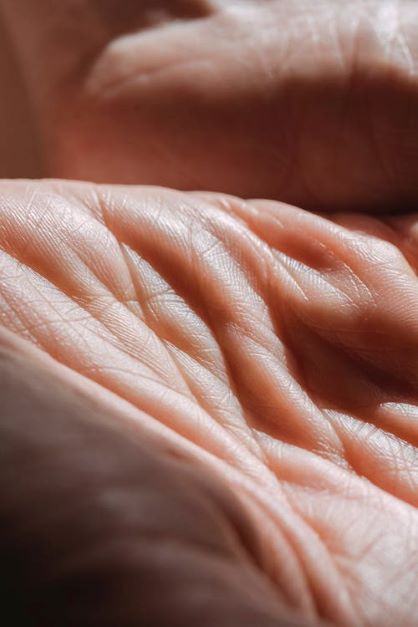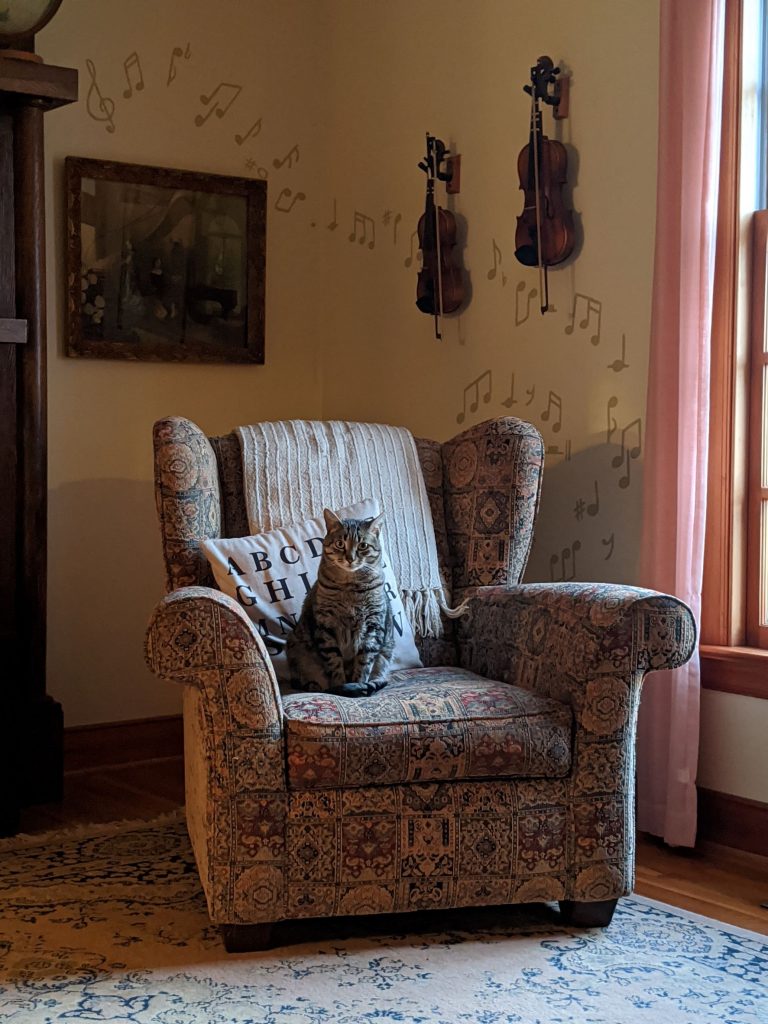
I was in a lavender field. Or a field of lavender. There were greens and purples everywhere. You were in the lavender field too. The lavender was beautiful, but I wanted nothing to do with you other than your bank details. It smelled like a local market, like I was lingering around the handmade goat soap stall trying to decide if I’d rather the honey or the pine. Soapy and mysterious.
I angled my face away from the sun, raising an arm over my eyes.
Your camera was on me.
I could see all your teeth when you said, ‘Marie, drop your arm. Your tattoos are twisting at some fucking weird angles.’
‘Fuck off,’ I mumbled, but I had already dropped my arm by the time I said it.
‘At least you can still take directions,’ you noted, a laugh twitching in your throat.
When I could stop envisioning myself stuffing you with lavender until you choked and died, I forced my mouth to close.
The lace neckline of my camisole scratched at my chest like a dog at the door. I hoped my skin wasn’t red. I tried to look sultry or dazed or bleary-eyed the way you liked me, but something buzzed close enough to my ear that I felt it. A bee. It landed in my hair. ‘Oh,’ I breathed, trembling. ‘There’s—there’s a bee.’
‘Don’t move,’ you demanded, instantly popping the zoom on your shitty camera.
My voice went high, weak with fear. I wanted to cut my head off and hit you with it, stinger-first. ‘Don’t—I’m, like, really allergic and I don’t have an EpiPen on me.’
‘Marie, are you kidding?’ you asked, but I wasn’t. ‘It’s a fucking lavender field. You didn’t think about there being a million bees?’
I was suddenly very hot.
The rustling of lavender stems was so loud I felt it on my face. Everything shifted, sideways. It left my hair and relief nearly made me sick but—fuck—it settled on my arm. The bee vibrated and vibrated. Skin contact. I could not decide if it was the fear keeping me in my death place or if it was the way you’d said – Don’t move.
Time slipped. Sweat slid down my spine. You were clicking in sync with the humming of the bee. The lavender was humming, too.
Smack!
‘Fuck!’ I yelped, ripping my arm out of your reach, away from your camera—bee be damned. Me be damned. I shook my arm violently, windmilling it like a little kid playing aeroplanes. No bee, but no stinger. Red was spreading like a wound, blood in water—shaped by your hand. ‘What the hell?’ I demanded, eyes wild.
Your eyebrows rose, your mouth so close to a smirk I wanted to kill you for it. ‘I killed it.’
‘And what if you’d helped it kill me? You—’ I stopped to exhale heavily. Distaste curled at my throat, now that terror had ebbed under the wave of shock. My heart thudded as if it was going to find a way out of me.
I ripped my eyes from yours and looked down. I couldn’t see the bee. Somehow the dirt had already swallowed it up.
‘I wasn’t going to let you die.’ You said it like you’d rather say anything else, but you were reading me like a room. ‘Pretending to grieve when the cops came would’ve been harder than getting a good picture of you.’
I swallowed. ‘You don’t mean that.’
‘Oh, I don’t know,’ you sighed whimsically. ‘It’ll be nightfall before we get out of here at this rate.’
My eyes were hot. I turned to you and you did not look an ounce sorry. You looked like you always did—eyes dark, amusement at your mouth, like you were a moment away from kicking my teeth in just to photograph the wreckage.
You made me feel fucking crazy. I felt it as I curled my toes in the damp earth of the field.
Fine.
I let go of my body, hoping my imminent death wasn’t in the slant of my mouth any longer, hoping yours was. I was making my own skin crawl and there was a roaring in my ears that sounded like a thousand bees. Neither of us spoke until the rain started; water misted across my eyelashes and your knees cracked as you stood, moving closer.
‘Don’t move,’ you said for the second time that day. I was the lavender and my hair was turning to goat milk soap out of the corner of my eye. I didn’t move. ‘Don’t blink.’
I sneered. ‘Is there anything you want me to do?’
You levelled a look at me, hate in your eyes. You probably stuck photos of me on a dartboard, but—I got the most likes on your Instagram. Maybe that was in your eyes. I felt it in mine every time I saw you’d posted another one. I liked being looked at, just not by you.
‘We should finish up anyway,’ I suggested, clearing my throat.
The laugh was startled out of you. ‘What? Why?’
‘My nipples are gonna start showing through my shirt…’
You eyed me, stepping too close, your breath hitting my cheek and ghosting down my skin warmly—we were in the opposite of a cold spot. Maybe because I had said it, I felt my nipples tighten. I thought about throttling myself too—to bee or not to bee, my hands or lavender stems?
‘Oh, that’s sad. You thought I’d care?’ Your chest shook with soundless laughter. Your shirt brushed mine.
‘Fine,’ I agreed flippantly. ‘No, I can’t think of anything I’d rather do than stand here getting wet while you photograph my hard nipples. That sounds really good.’
Your mouth did that ridiculous twitch.
Revulsion shivered on my tongue.
If I had driven here myself and wasn’t being paid to be in the lavender field, I’d figure out a way to bring the bees back, sting your airways swollen so you and your camera could die in each other’s arms until you decayed—though the field’s owner would probably find you before then…
I smiled and I knew it looked like normal. Soapy and mysterious. Honey or pine.
Water dripped off my eyelashes like tears and your camera clicked.
‘Crouch,’ you said, and I did. Wet dirt caught the edges of my white cotton skirt.
‘Leg out,’ you said, and it was. ‘Not like you’re fucking Spider-man… Yeah, Marie. Like that.’
The rain got heavier and you paused to take your hoodie off. I watched you wrap it around your camera like a swaddled baby to protect it. The water dripping between my shoulder blades down my spine was colder than it had been moments before.
‘Okay, lay down.’
I stared at you. You let out a quiet laugh and nudged me with your foot. I gritted my teeth as I put my back flat to the dirt and rain fell into my eyes. Somewhere under me was the dead bee.
You hummed, bracketing me with your legs as you peered down through the lens.
The symbolism of this moment was not lost on me.
‘Grab the dirt,’ you said, leaning down.
Mulch and soil curled between my fingers and my palm, digging into me. As water dribbled down my hand and back into the ground, I was as much the dirt as I had been the lavender. I was the field. I lost sight of you. My eyelashes fluttered and there was the scent of wet earth and lavender roots moving under me like a wave, like the rolling clouds, like the flowers buckling under a strong breeze.
Your foot nudged the side of my chest and I wrenched my eyes open to see you crouch over me, shuffling back to get the right angle. Your hair was clinging to the underside of your jaw, rivulets down your bared throat.
If I was the lavender field, you were either the sun or you were the rain. Invasive.
I wasted a second thinking about why you hated me. I hated you intimately and you hated me just as much, but I was not paying you to be photographed a slip of fabric away from being naked in a field half an hour from everyone you knew. Maybe it was because I hated you, but during our first shoot together you’d put me on my knees in an abandoned house, crunching in cicada shells and small cockroaches, and made me touch cobwebs so thick I couldn’t see through them.
‘Marie, you—’
After a second, you nudged your camera down so we made eye contact. I realised you had spoken. Why? ‘Hm?’
There was quiet. Nerves sparked in my chest as you stared, eyes too dark to be knowable. Rain slipped over your philtrum. ‘Do you regret working with me?’
I shuddered in the cold. ‘What?’
‘You fucking hate coming out with me,’ you shrugged. A strange smile corrupted your mouth before you fought it off. ‘And you only work with me, right? I can’t be enough for you.’
The water in your hair hit my throat like acid and the soap of my neck bubbled. I couldn’t say I cope by picturing your death over and over, so I said, ‘Uh. I don’t only work with you.’ The smile on your mouth stole over to mine, and it felt insidious. I was too close to you in that moment. ‘I do post other photos on my page that you didn’t take of me. I…I figured you’d seen them.’
‘No,’ you answered, head tilting. The smile was yours again. ‘No, Marie. I don’t follow you on Instagram. You’re just never busy when I need you, so I assumed I was your one and only.’
Oh, there was the urge to vomit. I wondered where it had gone. Lost to the rain, perhaps? But no, you’d found it.
The dead bee vibrated in its dirt grave, near the base of my spine.
Don’t move.
The rain let up eventually, but I don’t think I noticed.
It was edging into dusk by the time we left, twilight eating the shadows of lavender. We thanked the field owner where he stood at the back gate of his house to let us through. He gave us a block of purple vegan lavender soap each, carved with his farm’s name. I had to press my hands to my mouth not to laugh. You made me sit wrapped in the towel you had in the backseat of your car, covered in dog hair and sand.







